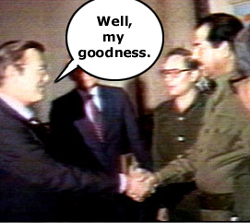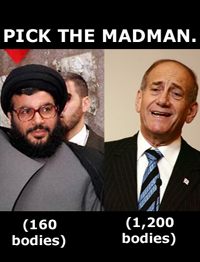Even as the U. S. media gears up for what promises to be the “trial of the century” of the year (that Jon Benet Ramsey murder case they’re obsessing about now), our trusty hometown newspaper found space on the front page (way below the fold) for one story coming out of Iraq — that of another “trial of the century”. Namely, Saddam Hussein’s second, at which he will answer charges of genocide against the Kurds during the Anfal campaign of 1987-8. Conspicuously absent from the stand, of course are  Saddam’s and “Chemical” Ali’s co-conspirators in the Reagan administration, as well as much of the congressional leadership at the time. Sure, Reagan’s dead, but many of his top people are still with us (particularly his special envoy to Baghdad, Donny “by gosh” Rumsfeld), some of whom have made their way back into the White House in the intervening years. At the very least, the full history of U. S. cooperation with Saddam up to, including, and well beyond the gassing and bombing of Kurdistan should be brought forward at this trial. But any such suggestion is merely laughable in the context of the U.S. occupation of Iraq.
Saddam’s and “Chemical” Ali’s co-conspirators in the Reagan administration, as well as much of the congressional leadership at the time. Sure, Reagan’s dead, but many of his top people are still with us (particularly his special envoy to Baghdad, Donny “by gosh” Rumsfeld), some of whom have made their way back into the White House in the intervening years. At the very least, the full history of U. S. cooperation with Saddam up to, including, and well beyond the gassing and bombing of Kurdistan should be brought forward at this trial. But any such suggestion is merely laughable in the context of the U.S. occupation of Iraq.
This trial isn’t about justice, it’s about public relations. This is the closest thing to good news our government can muster out of the disaster they have created in Iraq. It is very likely that upwards of 200,000 people have died in that country since our invasion of March 2003. Add that to the 300,000 to 500,000 who died because of the 12-year sanction regime (imposed by the U.S. and Britain) and we’re putting Saddam’s grisly numbers to shame. Though it isn’t reasonable to set our death toll against his, since we are also morally and materially culpable in the mass killings for which he is being held responsible. No one talks about it now, but Saddam received billions and billions in aid and war materiel from the United States during his 8-year war against Iran. His regime received logistical support and satellite intelligence, much as was provided to the Nicaraguan “Contra” terror army at about the same time. He received components for WMD’s from U.S. and European suppliers with a nod from their respective governments. He enjoyed considerable diplomatic support as well, particularly in the wake of the Halabja attack, which we tried to hang on Iran, if memory serves. Indeed, our support for the bad boy went on until days after he invaded Kuwait in 1990, fully two years after Halabja.
 You’ve heard me say all this before (those who’ve been reading this blog for a while), so forgive me for repeating myself. It is just that the entire history of our relationship with Iraq (and, indeed, with every nation in the greater Middle East area) goes unmentioned, unreferenced, and unremembered in the mainstream press. Those of us who do recall what happened end up sounding like Coleridge’s Ancient Mariner, but I suppose that is the only way to keep history alive — by utilizing this modern equivalent of an oral tradition. To listen to our leaders and our network newscasters, we are living in a world of clearly defined “good” and “evil”. But the definitions they offer do not hold an ounce of water, once you scratch beneath the surface a little bit (Olmert and Nasrallah come to mind). If Hussein belongs in the docket, then we should be standing right beside him, for the people who died twenty years ago… and for the people who are dying today.
You’ve heard me say all this before (those who’ve been reading this blog for a while), so forgive me for repeating myself. It is just that the entire history of our relationship with Iraq (and, indeed, with every nation in the greater Middle East area) goes unmentioned, unreferenced, and unremembered in the mainstream press. Those of us who do recall what happened end up sounding like Coleridge’s Ancient Mariner, but I suppose that is the only way to keep history alive — by utilizing this modern equivalent of an oral tradition. To listen to our leaders and our network newscasters, we are living in a world of clearly defined “good” and “evil”. But the definitions they offer do not hold an ounce of water, once you scratch beneath the surface a little bit (Olmert and Nasrallah come to mind). If Hussein belongs in the docket, then we should be standing right beside him, for the people who died twenty years ago… and for the people who are dying today.
The king is mad. Pass it on.
luv u,
jp
